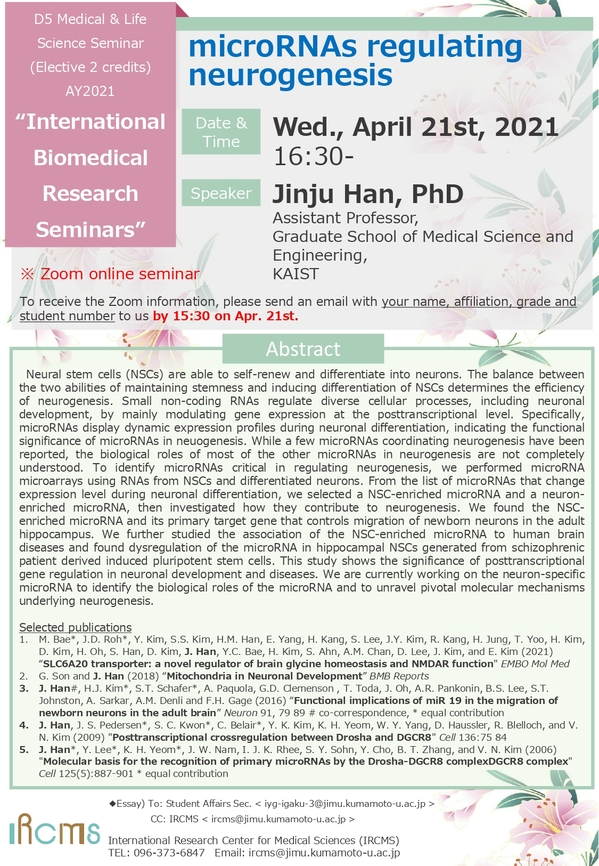- HOME
- News & Events
- [Apr.21] D5 Medical & Life Science Seminar-Dr. Jinju Han
News & Events
[Apr.21] D5 Medical & Life Science Seminar-Dr. Jinju Han
April 6 2021
The "D5 Medical & Life Science Seminar" course will be offered by International Research Center for Medical Sciences (IRCMS). It will run from April 2021 to March 2022, with lectures given by scientists who are affiliated with IRCMS or in collaboration with researchers at IRCMS. The lectures will be given once a month, in English, and by leading scientists in the relevant research field. Students will be taught: 1) how normal physiological functions are maintained in the human body; 2) how these systems become abnormal under certain pathophysiologic conditions; 3) why stem cells are important in animal development and homeostasis; 4) how stem cell-based approaches can help us understand disease mechanisms and find potential cure for diseases related to stem cell malfunction (e.g., cancer, aging).
Date : April 21, 2021 (Wednesday)
Time : 16:30 -
* Zoom online seminar
|
To receive the meeting ID / Password, please send an email to |
Speaker : Jinju Han, PhD
Assistant Professor,
Graduate School of Medical Science and Engineering,
Korea Advanced Institute of Science and Technology (KAIST)
Title : microRNAs regulating neurogenesis
Abstract :
Neural stem cells (NSCs) are able to self-renew and differentiate into neurons. The balance between the two abilities of maintaining stemness and inducing differentiation of NSCs determines the efficiency of neurogenesis. Small non-coding RNAs regulate diverse cellular processes, including neuronal development, by mainly modulating gene expression at the posttranscriptional level. Specifically, microRNAs display dynamic expression profiles during neuronal differentiation, indicating the functional significance of microRNAs in neuogenesis. While a few microRNAs coordinating neurogenesis have been reported, the biological roles of most of the other microRNAs in neurogenesis are not completely understood. To identify microRNAs critical in regulating neurogenesis, we performed microRNA microarrays using RNAs from NSCs and differentiated neurons. From the list of microRNAs that change expression level during neuronal differentiation, we selected a NSC-enriched microRNA and a neuron-enriched microRNA, then investigated how they contribute to neurogenesis. We found the NSC- enriched microRNA and its primary target gene that controls migration of newborn neurons in the adult hippocampus. We further studied the association of the NSC-enriched microRNA to human brain diseases and found dysregulation of the microRNA in hippocampal NSCs generated from schizophrenic patient derived induced pluripotent stem cells. This study shows the significance of posttranscriptional gene regulation in neuronal development and diseases. We are currently working on the neuron-specific microRNA to identify the biological roles of the microRNA and to unravel pivotal molecular mechanisms underlying neurogenesis.
Selected publications:
- M. Bae*, J.D. Roh*, Y. Kim, S.S. Kim, H.M. Han, E. Yang, H. Kang, S. Lee, J.Y. Kim, R. Kang, H. Jung, T. Yoo, H. Kim, D. Kim, H. Oh, S. Han, D. Kim, J. Han, Y.C. Bae, H. Kim, S. Ahn, A.M. Chan, D. Lee, J. Kim, and E. Kim (2021) "SLC6A20 transporter: a novel regulator of brain glycine homeostasis and NMDAR function" EMBO Mol Med
- G. Son and J. Han (2018) "Mitochondria in Neuronal Development" BMB Reports
- J. Han#, H.J. Kim*, S.T. Schafer*, A. Paquola, G.D. Clemenson , T. Toda, J. Oh, A.R. Pankonin, B.S. Lee, S.T. Johnston, A. Sarkar, A.M. Denli and F.H. Gage (2016) "Functional implications of miR 19 in the migration of newborn neurons in the adult brain" Neuron 91, 79 89
# co-correspondence, * equal contribution - J. Han, J. S. Pedersen*, S. C. Kwon*, C. Belair*, Y. K. Kim, K. H. Yeom, W. Y. Yang, D. Haussler, R. Blelloch, and V. N. Kim (2009) "Posttranscriptional crossregulation between Drosha and DGCR8" Cell 136:75 84
- J. Han*, Y. Lee*, K. H. Yeom*, J. W. Nam, I. J. K. Rhee, S. Y. Sohn, Y. Cho, B. T. Zhang, and V. N. Kim (2006) "Molecular basis for the recognition of primary microRNAs by the Drosha-DGCR8 complexDGCR8 complex" Cell 125(5):887-901
* equal contribution
Flyer: (Click for a larger image)

